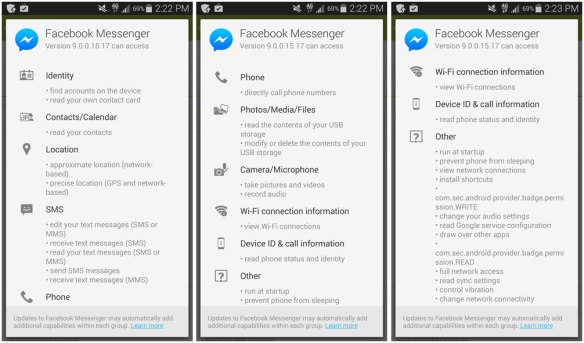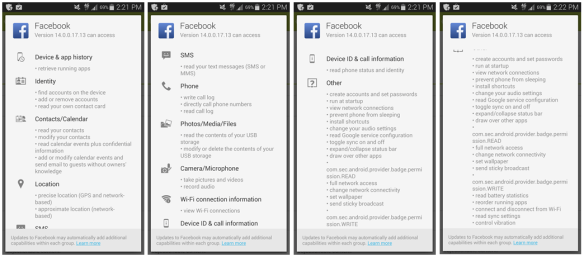There was a discussion post in the classroom not too long ago regarding the Facebook Messenger app and the privacy issues it aroused. I remember (all the way back in 2014) trying to access my messages and getting that stupid little cartoon telling me my messages have moved. I wasn’t really concerned about my “online privacy” – I had nothing to hide, no information to share, I was more upset that I had to find room for this thing just to view my messages on the go. What as the hullabaloo about? Why are we so concerned with our “online privacy”. What does this have to with me liking my friend’s status about going bowling?

The bane of my existence for… three or so months.
Well… what is online privacy? Because I’m having trouble formulating the exact words I’ll reach to the Internet for assistance:
Online privacy is the right or mandate of personal privacy concerning the storing, re-purposing, provision to third parties, and displaying of information pertaining to oneself via the Internet. Internet privacy is a subset of data privacy. Privacy concerns have been articulated from the beginnings of large scale computer sharing.[1]
Privacy can entail either Personally Identifying Information (PII) or non-PII information such as a site visitor’s behavior on a website. PII refers to any information that can be used to identify an individual. For example, age and physical address alone could identify who an individual is without explicitly disclosing their name, as these two factors are unique enough to typically identify a specific person.
This can affect you in a multitude of ways – if there is a privacy breech you could have from having your online identity (or your actual) stolen, your images could be used without permission,or your personal information being sold.
But what did this have to do with the world-wind of people not wanting to install the Messenger app?
People were more worried about invasive permissions – meaning that Facebook wanted more permissions than most apps were asking for – this raised a lot of eyebrows. People were stating that Facebook would read user messages and pull data to focus adverting efforts on users, it would have constant access to the users microphone and camera. While none of this is completely true, those who still had the Facebook app were still allowing nearly all of the same permission that the Facebook Messenger app requested.


Comparison of Facebook app vs Facebook Messenger versions
I was hesitant to download the app (not just because I didn’t want to add in another app to my already limited storage) but because the Internet was in uproar about the Facebook Messenger privacy. Had I read the specs I would have learned that I’m basically in the same boat with my current app. I eventually downloaded the app (for those burning to know) but I did it out hating to see that notification lingering in the Facebook app. The way I personally saw it, I post hardly anything (expect for pictures of my dog) and I’ve turned my location settings off – which, to me, is the biggest issue with privacy.
But for those wanting to protect their online privacy there are some precautions for those to take to be sure they’re browsing at their safest.
- Don’t over share
- Limit the cookies stored on your browser
- If you’re super serious – encrypt your data when using email or cloud based storage
- Don’t link all of your social media accounts
- Use anti-virus software
- Use strong passwords and be sure to log out of your accounts
Articles that supplemented this article:

Internet privacy can be very confusing to the average person, especially when concerns begin spreading like wildfire. I remember when everyone was posting and talking about the Messenger app, and how everyone was focused on privacy invasion but not on the facts surrounding it. I like how your post has a side by side comparison of the Facebook and Messenger apps and their permissions. That is very effective and practical, as are your six tips at the end. Nice post, Katie!
-Allen Morgan
LikeLiked by 1 person
Hey there! Thanks for referencing my article in your post. I really enjoyed reading your story – some really good points made!
LikeLike
Thank you for stopping by! As you can tell, I really enjoyed reading your article.
LikeLike
Katie, thank you, we need this information to be given to us more often and since this was very straightforward, it was easy to understand. I’m certain there is overexposure for most of us. My personal peeve is when some stupid little app wants access to my phone contacts, really??? I don’t think so! But maybe i need to turn off my location as well.
LikeLiked by 1 person
Thank you,Katie for sharing those security tips, I’m going to start keeping all my social accounts separated. I think it is a potential trade-off when you use free apps and in return we have to permit access to our device information. Like yourself, I pay close attention to my location settings, I try to keep it off all the time. I know a good practice is to delete my location history on my Android and if I’m going ghost, I will disable location reporting and location history from the Google location settings.
LikeLiked by 1 person
Thanks for such an interesting and informative post! It is really scary more than we think when it comes to accessing your phone privacy through apps! Sometimes we do not care about this message popping up to asking to access your information as much as we care about using the app itself.
LikeLike
Thanks for such an interesting and informative post! It is really important to think before using an app that asks to access your private information. It is not a joke! Bank account information or any other private information could be stolen through a small app used on Facebook really.
LikeLike
Thank you for sharing! Never thought about the impact of linking all my social media accounts together has on privacy/security concerns. Interesting post!
LikeLike